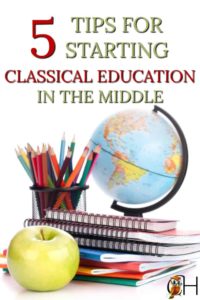5 Tips for Starting Classical Education in the Middle
This post may contain affiliate links. For more information, please read my disclosure policy.
Have you ever wondered about starting classical education in the middle and if it’s actually possible?
The answer is a resounding yes! It doesn’t matter if your child is a 3rd, 7th, or even 12th grader.
As a matter of fact, you can even start giving yourself a classical education as an adult!
When you’re starting classical education in the middle you must remember that there is no magical finish line. Kids don’t reach 12th grade and magically know everything there is to know.
Classical Education is a Journey, Not a Destination
Let’s think about this for a second. Classical education is a journey, not a destination. There is no designated endpoint at which you can say, “You’ve now learned everything there is to know.”
There’s no point at which you can say, “I now understand everything there is to know about what it means to be a human being.”
Education never ends. There’s always more to read, more to learn, and more to discover. The goal is to awaken our children to the questions, to the concepts, and to the wonder of the natural world. Not to drill concepts into their heads until they loathe the idea of education.
Ultimately classical education should change you, just as a long journey will change you. You’ll discover ideas and concepts which will challenge your beliefs.
Classical education is not about the destination. It’s about what you discover along the way.
So as you’re starting your kids out in classical education, your goal is to put their feet on the path. Help them discover the wonder of learning. Your goal is not to reach the pinnacle of Mt. Parnassus before the kids are 18.
{Related post: How to Start Classical Education in the Middle}
Jump in and Start Swimming
Chances are if you’re starting classical education with an older child. Your child already reads. Your child knows basic math.
So don’t try to go back and cover everything from the beginning before jumping into age-appropriate material.
After all, you only have so much time before your child grows up.
If you have a high school teen, go ahead and begin reading the Great Books. Add a logic program to your homeschool. And enjoy memorizing poetry together for a few minutes over breakfast. Concentrate on giving your child a rich classical education in the last few years your child is home. Aim for excellence, not perfection.
The same applies to middle school. Jump into classical education where you are. Don’t try to memorize all of the grammar rules overnight before starting a logic, or critical thinking, program.
Add time for memorization to your day. Start learning logic. And start learning Latin.
Your child will still have an excellent education by the time graduation rolls around.
Work for Mastery
Mastery is more important than speed. Does it matter if your kids study calculus if they can’t figure out how to solve fractions? Eventually, they’ll need to go back and relearn the information.
Concentrate on mastery. Teach your kids to master the material and own their education. After a time you’ll find the kids will say, I need to review this material. I don’t think I understand it fully…. even when they passed the test.
They’ll own their education. They’ll work to master the material. And then your kids will learn to excel!
Master will allow your kids to continue to move forward. Mastery and diligence work hand in hand. Be diligent about sitting down to homeschool your kids and give them a classical education.
Don’t try to rush through the material to meet a deadline. Simply keep moving forward as fast as your kids can master the material. And don’t worry if one child speeds through math at two grades a year, provided they master the material.
Don’t worry if one child slowly moves through the grades like a turtle. Concentrate on diligence and mastery. With diligence and mastery, everything else takes care of itself.
{Related post: Diligence is Key to the Well-Run Homeschool}
Don’t Rush
As your goal is not to pound all of the knowledge mankind has on every topic into your child’s head by the end of 12th grade, there’s no need to rush. Even if you’re starting with a 12th grader.
There’s only so much time in the day. so much time in the year. And so much time between 5 and 18. You won’t cover it all. So don’t try.
Instead, take your time, enjoy the process, and concentrate on diligence rather than speed.
A little time each day will allow you to make more progress than if you attempt to make up for the lost time. You’ll end up going back to relearn material when you rush the learning process.
Concentrate on setting a good example and encouraging the kids to continue their education even as adults.
{Related post: Festina Lente: Make Haste Slowly }
Enjoy Yourself
Enjoy the process and don’t get hung up trying to do classical education the right way. Quite frankly you’ll find a hundred opinions on what classical education is and should be.
That’s because classical education has adapted with the times. How the Romans educated their children is different than the way the Greeks educated their kids. And the way the Medieval scholars were educated. Even into the 1800’s it changed, adapted, and morphed.
Now there are several different thoughts on what the guiding principles of classical education should be. Should you be Latin-centered and concentrate on teaching your kids to read and write in Latin? Are you a failure if your kids never reach that level?
Or perhaps you should follow the trivium approach where elementary kids concentrate on memorization. Dialectic kids focus on developing their logic skills and rhetoric kids focus on learning to articulate themselves well.
Ultimately do what is right for your family and your children. And enjoy yourselves in the process. Develop a sense of wonder in your kids at the glory of the natural world. Encourage kids to ask questions, read classic literature, and dive into the great books. And if you can’t keep up the pace, slow down.
It’s better to dive deep than skim the surface of all the different concepts.
{Related post: How to Keep a Sense of Wonder and Curiosity}
When you’re starting classical education in the middle, you don’t need to rush to catch up. Simply jump in where you are, start studying, and enjoy the process.
RECOMMENDED READING
Books:
- The Well-Trained Mind
- The Liberal Arts Tradition
- Consider This: Charlotte Mason and the Classical Tradition
Links:
- Do You Really Know What Classical Education Is?
- What Exactly Is the Dialectic Stage?
- What Do You Know About the Rhetoric Stage?









